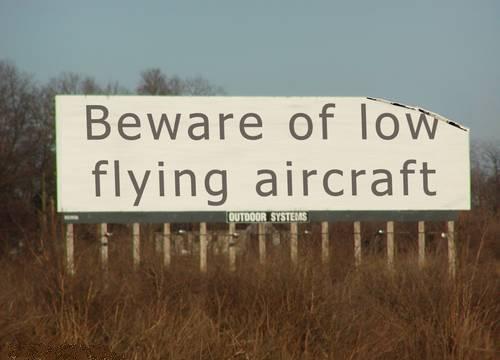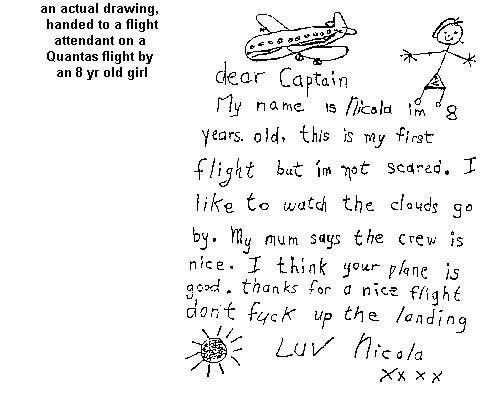Don't F*ck Up the Landing


# Carol Coleman at The Times - Ireland: I wanted to slap him - Ms. Coleman interviewed "the leader of the free world", and neglected to kiss his shoes. Poe widdo Bushy. The big bad jonowist hurt his feewings. Good for her. [lew]
George W Bush was so upset by Carole Coleman's White House interview that an official complaint was lodged with the Irish embassy. The RTE journalist explains why the president made her blood boil
# Jeff Hecht at New Scientist - Third Category 5 hurricane breaks record - Wilma, with sustained wind speeds of 175 mph, is even stronger than Katrina or Rita. And it has broken the record for the lowest pressure at the eye, 882 millibars. [grabbe]
A 24-hour hurricane warning is in effect for the east coast of the Yucatan Peninsula and a hurricane watch is in place for the western end of Cuba. Forecasters expect Wilma to move into the Gulf of Mexico through the channel between the Yucatan Peninsula and Cuba, then turn sharply to the northeast and pass over southern Florida. Projections indicate it will weaken before making landfall south of Fort Myers, Florida, late on Saturday.
# Lisa Hoffman at Capitol Hill Blue - The War on Drugs is Over: We Lost - so says Robert Owens, a former East Los Angeles drug warrior who has joined Law Enforcement Againt Prohibition (LEAP) in calling for the end of the war on some vegetables. [grabbe]
"This is not a war on drugs. It's a war on people," said LEAP executive director Jack Cole, who worked for 12 years as an undercover narcotics officer with the New Jersey State Police.
Cole and others in the group acknowledge their beliefs are hotly controversial, but they contend that there are far more police officers and others who share their point of view but can't risk the ostracism and professional damage that could occur if they went public. In fact, the organization welcomes members who want to remain anonymous and promises them their identities will never be revealed.
# Gene Callahan at LewRockwell.com - Dropping the Bomb - Mr. Callahan uses Elizabeth Anscombe's ideas to rebut Victor David Hanson's criticism of his earlier piece on Truman's atomic bombing of two Japanese cities at the end World War II. [lew]
Anscombe is not naïve: she acknowledges that the conditions of modern warfare have expanded the pre-modern limits on legitimate targets so that they now include some citizens of enemy states who are not strictly military personnel. However, she decries the moral lassitude that responds to that increased ambiguity not by attempting to hone one's discernment of the relevant distinctions but by shrugging and allowing that every inhabitant of enemy territory is fair game. Genuine uncertainty about where to draw the line between combatants and non-combatants doesn't mean that it should be erased altogether. A worker in a munitions factory might reasonably be considered a combatant. A worker in a steel factory that supplies the munitions factory could be a borderline case. But the village baker, who is merely continuing to earn his livelihood as he did before the war, can only be regarded as a military target by those who simply seek license to undertake whatever brutalities they hope will advance their strategic aims. As Anscombe caustically remarks about such an indiscriminate reckoning of combatants: "I am not sure how children and the aged fitted into this story: probably they cheered the soldiers and munitions workers up."
...
In response to my noting, "Japan was willing to discuss its terms of surrender, and was not demanding that of the US," Hanson replies: "Tell all that to the Chinese in Nanking or those who fought on Okinawa. In such a world of relativism it makes no difference who starts wars, much less whether they are fought by fascists or democracies."
That is a bizarre non sequitur. How in the world do the atrocities committed by Japanese troops in Nanking, however awful they were, contradict the fact that, in the summer of 1945, Japan was ready to sue for peace? How are they relevant to the morality of dropping atomic bombs on Japanese civilians? It's not as though slaughtering a sufficient number of the residents of Hiroshima and Nagasaki would undo the evil perpetrated in Nanking. Certainly very few of the people who were incinerated by the A-bombs had taken part in those earlier crimes. Apparently, in Hanson's moral universe, if today I am roughed up by Italian Mafioso, then tomorrow I am entitled to wipe the island of Sicily off of the map.
...
In point of fact, per Hanson's own principles, a terrorist like Osama bin Laden must be categorized as mistaken rather than evil. Since, for him, deliberately killing non-combatants in a war is not immoral for side A if side B started the conflict, it follows that if bin Laden's belief that the US and its allies have been engaged in a systematic effort to subjugate the Moslem world were correct, then he has been justified in acting against civilians from the West. Hanson has no grounds for morally condemning al Qaeda; he is entitled to chastise the terrorists only for having made a geopolitical misjudgment. I want to emphasize that I am not trying to support that view -- indeed, my own understanding of the moral principles applicable to such situations leads me to declare that bin Laden and his cohorts are evil even if their interpretation of the West's recent interactions with Islam is entirely correct. I consider al Qaeda to be evil because it deliberately targets and kills non-combatants as a means of achieving its political ends, a judgment entirely independent of any view as to how reasonable or outrageous are those ends.
# Joseph Sobran - "National Service" And Involuntary Servitude - the military draft and any kind of mandatory public "service" are both obvious violations of the thirtheenth amendment's prohibition on slavery. But since it's the government's own courts that "interpret" the Constitution, they can do anything they want. [lew]
The U.S. Constitution was an ingenious but unsuccessful attempt to specify and thereby limit the powers of the Federal Government. By listing those powers in Article I, it implicitly (and, in the Tenth Amendment, explicitly) forbade the exercise of other, unlisted powers. This was supposed to guarantee lawful government.
But the Federal Government has been trying to circumvent its own Constitution ever since. One essential method has been to make its own courts the final judge of how broadly its powers are to be construed. This allows the courts, in effect, to rewrite the contract without the consent of anyone else, making the Constitution, as Jefferson put it, "a blank paper by construction."
